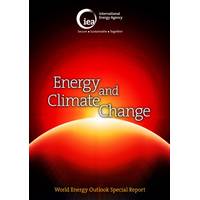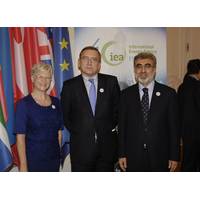New IEA Boss Faces Fluid Energy Landscape
Career economist replaces politician; insiders complain of low morale. The new head of the International Energy Agency faces dilemmas that challenge the purpose of the body set up to protect the interests of the West against the power of OPEC in the 1970s. Fatih Birol of Turkey -- the IEA's respected chief economist -- takes over on Tuesday, replacing Dutch politician Maria van der Hoeven, a former economy minister whose four-year term has expired. "There is a lot of expectation on Birol -- not just external performance, but crucially internal upgrade and institutional strategy," said one official on condition of anonymity.
IEA Sets Out Pillars for Success at COP21

A peak in global energy-related emissions could be achieved as early as 2020 and at no net economic cost, the International Energy Agency (IEA) said on Monday in its new World Energy Outlook Special Report on Energy and Climate Change. The Agency showed how to achieve an early peak in emissions as one of four key pillars that it believes are needed to make the upcoming UN climate talks a success, from an energy perspective. According to the IEA, the world is at a critical juncture in its efforts to combat climate change, with momentum building towards the 21st UN Conference of the Parties (COP21) in Paris in December 2015.
Indonesia’s Economic Success Hinges on Energy Investments
New IEA review of country’s energy policies lauds phase-out of gasoline subsidies as key first reform. Indonesia is enhancing the governance and transparency of its energy institutions and state-owned companies, reducing fuel subsidies and facilitating much-needed infrastructure investments, the International Energy Agency (IEA) said today in its second in-depth review of the country’s energy policies, but it must move to meet demand growth and ensure the environmental sustainability of energy supplies. The…
Birol Elected as IEA Executive Director

The International Energy Agency (IEA) elected Turkish economist Fatih Birol as executive director, the Paris-based agency confirmed on Friday, a day after it was announced by Turkey. The current executive director, Maria van der Hoeven, a former Dutch economy minister, took over in September 2011 and will complete her stint at the end of August. Birol has served as chief economist at the IEA for the last nine years of his 20-year tenure at the West's energy agency, which was founded in response to the first oil shock in 1973-74 and coordinates the release of emergency oil stocks.
‘Business as Unusual’ for Oil in the Medium Term

The recent crash in oil prices will cause the oil market to rebalance in ways that challenge traditional thinking about the responsiveness of supply and demand, the International Energy Agency (IEA) said in its annual Medium-Term Oil Market Report (MTOMR). The U.S. light, tight oil (LTO) revolution has made non-OPEC production more responsive to price swings than during previous market selloffs, the report said, adding that this would likely set the stage for a relatively swift recovery. At the same time, lower oil prices will not provide as strong a boon to oil demand growth as might be expected.
IEA: U.S. Oil Output "party" Until 2020
Russia to be oil industry's "top loser" in medium term-IEA; Global oil demand growth to accelerate in 2016. The United States will remain the world's top source of oil supply growth up to 2020, even after the recent collapse in prices, the International Energy Agency said, defying expectations of a more dramatic slowdown in shale growth. The agency also said in its Medium Term Oil Market report that oil prices, which slid from $115 a barrel in June to a near six-year low close to $45 in January, would likely stabilise at levels substantially below the highs of the last three years.
IEA: Europe Needs a Single Energy Market
Better energy connections would maximise supply; Russian gas set to stay dominant, energy union can help. Carbon market reforms should be introduced now. The European Union must not create a buyers' cartel in its bid to build a single energy market and curb reliance on Russian gas, the International Energy Agency (IEA) said on Monday. Conflict between Russia, the EU's biggest energy supplier, and Ukraine has focused efforts on a reinforced EU energy market with better cross-border links to share out power and gas and deliver fair pricing.
IEA: Morocco’s Energy Policies on Track

Strong initiatives on energy access and renewable energy as well as subsidy reform reflect government determination. Morocco’s energy strategy is very much on target, with notable advances in wind and solar power and on fuel subsidy reform, the International Energy Agency (IEA) says in its in-depth review of Morocco's energy policies. The new report notes that while the country’s power sector restructuring is under way, there is scope for further progress in energy efficiency. “Under political guidance from the highest level…
Energy Sector Key to Powering Prosperity in Sub-Saharan Africa
IEA World Energy Outlook Special Report finds that action in the energy sector could unleash an extra decade of growth. Increasing access to modern forms of energy is crucial to unlocking faster economic and social development in sub Saharan Africa, according to the International Energy Agency’s (IEA) Africa Energy Outlook, a Special Report in the 2014 World Energy Outlook series. More than 620 million people in the region (two-thirds of the population) live without electricity, and nearly 730 million people rely on dangerous, inefficient forms of cooking.
Oil Price Slump Yet to Hit US Shale Oil Production

The vast majority of shale oil in the United States is produced at costs far below the current price of crude, the head of the west's energy watchdog said, which means U.S. projects can withstand the market slump squeezing other producers. Brent oil stands at around $88 per barrel, down more than 23 percent from the year's peak above $115 in June, raising concern that some shale oil projects will become un-economic. However Maria van der Hoeven, executive director of the International Energy Agency said that only a tiny minority of shale oil production would be affected by the slump in prices to near-four-year lows.
$310 Billion 'Energy Efficiency' Market Grows Rapidly

IEA report sees energy efficiency finance becoming established market segment in its own right ... The global energy efficiency market is worth at least $310 billion a year and growing, according to a new report from the International Energy Agency that confirms the position of energy efficiency as the world’s “first fuel”. The report also finds that energy efficiency finance is becoming an established market segment, with innovative new products and standards helping to overcome risks and bringing stability and confidence to the market.
IEA Hails Launch of Carbon Capture and Storage Project

Canada’s Boundary Dam is reported to be the world’s first large-scale power station to trap CO2. The International Energy Agency (IEA) welcomed the launch of the world’s first large-scale power station equipped with carbon capture and storage (CCS) technology, calling it a historic milestone along the road to a low-carbon energy future. The 110MW retrofit of SaskPower’s Boundary Dam coal-fired power plant in Saskatchewan, Canada will trap around 1 million tonnes of carbon dioxide (CO2) per year. The captured CO2 will be injected into nearby oilfields to enhance oil recovery.
Policy Uncertainty Threatens to Slow Renewable Energy Momentum

IEA forecast sees renewable power as a cost-competitive option in an increasing number of cases, but facing growing risks to deployment over the medium term. The expansion of renewable energy will slow over the next five years unless policy uncertainty is diminished, the International Energy Agency (IEA) said today in its third annual Medium-Term Renewable Energy Market Report. According to the report, power generation from renewable sources such as wind, solar and hydro grew strongly in 2013, reaching almost 22% of global generation, and was on par with electricity from gas, whose generation remained relatively stable.
$80 Billion Wasted Powering Online Devices in 2013

Simple measures can keep problem of inefficient ‘network standby’ from worsening in years ahead, IEA report says. Today, the world’s 14 billion online electronic devices – such as set-top boxes, modems, printers and game consoles – waste around USD 80 billion each year because of inefficient technology. By 2020, the problem will considerably worsen, with an estimated USD 120 billion wasted. But a report by the International Energy Agency points to a different path, identifying simple measures that can be implemented now to improve energy efficiency in networked devices, resulting in massive savings of energy and money.
IEA: Unconventional Oil Revolution to Spread by End of Decade

The IEA’s Medium-Term Oil Market Report 2014 will be officially launched during a Press webinar on Tuesday, June 17, 2014, 11 a.m. Paris time. In addition, a web-based technical briefing will take place on June 17, at 16:30 Paris time where journalists will have an opportunity to put questions to the team that produced the Medium-Term Oil Market Report 2014. The unconventional supply revolution that has redrawn the global oil map will likely expand beyond North America before the end of the decade, the International Energy Agency (IEA) says in its annual five-year oil market outlook released today.
World Energy Needs Require $48 Trillion Investment by 2035
Meeting the world's growing need for energy will require more than $48 trillion in investment over the period to 2035, according to a report on investment released today by the International Energy Agency (IEA) as part of the World Energy Outlook series. Today's annual investment in energy supply of $1.6 trillion needs to rise steadily over the coming decades towards $2 trillion. Annual spending on energy efficiency, measured against a 2012 baseline, needs to rise from $130 billion today to more than $550 billion by 2035.
U.S. Refiners Struggle with Light Crude
Most of the extra oil produced in the United States in the next two years will be light crudes and condensates that domestic refineries will struggle to process - intensifying pressure for at least a partial relaxation of the country's export ban. U.S. oil production is set to increase by another 2 million barrels per day in 2014-15. More than 60 percent of the forecast growth will consist of light oils with a specific gravity of 40 degrees API or higher, according to the U.S. Energy Information Administration ("U.S. crude oil production forecast: analysis of crude types", May 29).
Brent Rises on Libyan Supply Doubts
Brent crude reversed early losses and rose towards $109 a barrel on Tuesday, as traders expressed doubt about how quickly supplies will return from Libya, while the threat of further Western sanctions against Russia provided additional support. Libya said on Monday its western oilfields were ready to reopen, having been blocked by protests since March, potentially raising crude output from the North African country by 500,000 barrels per day (bpd). On Tuesday output from Libya was still just 235,000 bpd, however…
Estonia Named 29th Member of the IEA

Estonia today officially became the 29th member of the International Energy Agency (IEA), Executive Director Maria van der Hoeven announced, as the Baltic country completed the final step towards full membership. "We are delighted to welcome Estonia into the IEA," Van der Hoeven said. "Estonia, like the IEA and its member countries, prizes energy security, economic development and sustainability. Urve Palo, Estonian Minister of Economic Affairs and Communications, said, "Accession to the IEA is an important milestone for Estonia in order to become an active participant in global energy policy.
World Petroleum Congress to be held in Moscow
Deputy Prime Minister of the Russian Federation, Arkady Dvorkovich, has confirmed that the 21st World Petroleum Congress will be held in Moscow from 15 – 19 June 2014. The congress will be the largest international event in the global oil and gas industries. Dr. Over 500 other industry leaders and decision makers. The recent geopolitical situation in Ukraine, including sanctions and other macroeconomic and political factors, could have a strong impact on the world’s oil and gas markets. Although they do not adversely affect the Congress itself under the current scenarios…